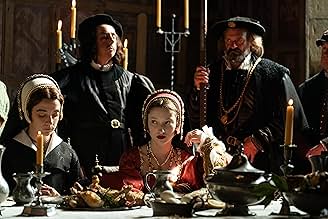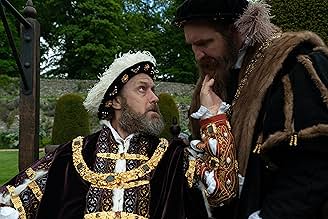IMDb RATING
6.3/10
5.8K
YOUR RATING
Katherine Parr, the sixth wife of King Henry VIII, is named regent while the tyrant battles abroad. When the king returns, increasingly ill and paranoid, Katherine finds herself fighting for... Read allKatherine Parr, the sixth wife of King Henry VIII, is named regent while the tyrant battles abroad. When the king returns, increasingly ill and paranoid, Katherine finds herself fighting for her own survival.Katherine Parr, the sixth wife of King Henry VIII, is named regent while the tyrant battles abroad. When the king returns, increasingly ill and paranoid, Katherine finds herself fighting for her own survival.
- Awards
- 1 win & 2 nominations total
Linnea Martinsson
- Maud Lane
- (as Linnéa Martinsson)
Lisa Pyk
- Eleanor Browne
- (as Lisa Pyk Wirström)
Featured reviews
STAR RATING: ***** Brilliant **** Very Good *** Okay ** Poor * Awful
Henry VIII (Jude Law) returns from battle, ailing and injured. His present wife, Katherine Parr (Alicia Vikander) has an alliance with Anne Askew (Erin Doherty), a radical who still preaches the Protestant faith with a group of fellow followers. After executing a friend of Katherine's, she is forced to maintain a solid show of unity with her monarch husband, as he cracks down on the Protestant rebels, and all who support them.
While I did have a brief fixated interest in the Tudors and Stuarts as a young boy, it gradually faded over time. But one that remained ingrained in my, and probably many others who studied the topic, was King Henry VIII, a figure as large in figure as he was in life, the rock and roll king, who played by his own rules and lived his life in full blown bombastic fashion, in a manner that would make Donald Trump and Boris Johnson blush. Director Karim Anouz's historical drama delves into his being with unreserved zeal, portraying him as the tyrannical monster he truly was.
In the lead role, what must be a heavily made up Jude Law portrays said king, completely unrecognisable as a result of his transformation, but still able to deliver quite a compelling performance. In the other central roles, Vikander and Doherty are two powerful, commanding female leads, in roles as vital to the accuracy of the tale as the main character, complimented by a supporting cast including Sam Riley and Eddie Marsan. Anouz certainly doesn't hold back visually either, with some full on sex and violence. Despite all of this, however, there is never enough spark and energy in the script to really give it the power it needs.
In the present turbulent times with 'strongmen' leading everywhere, this is an even more prescient and inspiring idea for a film. The performances are strong and the era recreation is convincing, but they're sadly let down by a script that doesn't match them. ***
Henry VIII (Jude Law) returns from battle, ailing and injured. His present wife, Katherine Parr (Alicia Vikander) has an alliance with Anne Askew (Erin Doherty), a radical who still preaches the Protestant faith with a group of fellow followers. After executing a friend of Katherine's, she is forced to maintain a solid show of unity with her monarch husband, as he cracks down on the Protestant rebels, and all who support them.
While I did have a brief fixated interest in the Tudors and Stuarts as a young boy, it gradually faded over time. But one that remained ingrained in my, and probably many others who studied the topic, was King Henry VIII, a figure as large in figure as he was in life, the rock and roll king, who played by his own rules and lived his life in full blown bombastic fashion, in a manner that would make Donald Trump and Boris Johnson blush. Director Karim Anouz's historical drama delves into his being with unreserved zeal, portraying him as the tyrannical monster he truly was.
In the lead role, what must be a heavily made up Jude Law portrays said king, completely unrecognisable as a result of his transformation, but still able to deliver quite a compelling performance. In the other central roles, Vikander and Doherty are two powerful, commanding female leads, in roles as vital to the accuracy of the tale as the main character, complimented by a supporting cast including Sam Riley and Eddie Marsan. Anouz certainly doesn't hold back visually either, with some full on sex and violence. Despite all of this, however, there is never enough spark and energy in the script to really give it the power it needs.
In the present turbulent times with 'strongmen' leading everywhere, this is an even more prescient and inspiring idea for a film. The performances are strong and the era recreation is convincing, but they're sadly let down by a script that doesn't match them. ***
Worth seeing movie but there are some significant problems - which are the fault of the director.
The positives: the film is absorbing with good performances, costumes and sets.
But a bunch of negatives, including some completely false presentation of history, particularly regarding Henry VIII's death.
This is unforgivable IMO.
And although the premise of the movie (based on a novel) is Catherine Parr as "feminist" queen, the movie inexplicably omits important information and context that actually illustrate her "feminist" achievements. For example no mention of her backstory (that she was twice a widow by the age of 31 when she was married to Henry VIII) and not clarifying her remarkable educational abilities and accomplishments including that she was fluent in Latin, French and Italian and the first woman in England to publish written work in English. Historians describe her as having good sense, moral rectitude, compassion, firm religious commitment, a strong sense of loyalty and devotion and embracing Henry's children Mary, Elizabeth and Edward.
There are also noticeable and distracting script and social behavior anachronisms - examples such as casual dialogue and contemporary language such as using the word "pregnant" instead of "with child"
Getting back to the director - a man, not British and Firebrand was his first English language film.
Hiring him as the director was a poor decision and disrespectful to the subject matter.
There would have been multiple other good choices - especially people with period piece experience such as Simon Curtis (Downton Abby), Tom Hooper (King's Speech), Stephen Frears.
The positives: the film is absorbing with good performances, costumes and sets.
But a bunch of negatives, including some completely false presentation of history, particularly regarding Henry VIII's death.
This is unforgivable IMO.
And although the premise of the movie (based on a novel) is Catherine Parr as "feminist" queen, the movie inexplicably omits important information and context that actually illustrate her "feminist" achievements. For example no mention of her backstory (that she was twice a widow by the age of 31 when she was married to Henry VIII) and not clarifying her remarkable educational abilities and accomplishments including that she was fluent in Latin, French and Italian and the first woman in England to publish written work in English. Historians describe her as having good sense, moral rectitude, compassion, firm religious commitment, a strong sense of loyalty and devotion and embracing Henry's children Mary, Elizabeth and Edward.
There are also noticeable and distracting script and social behavior anachronisms - examples such as casual dialogue and contemporary language such as using the word "pregnant" instead of "with child"
Getting back to the director - a man, not British and Firebrand was his first English language film.
Hiring him as the director was a poor decision and disrespectful to the subject matter.
There would have been multiple other good choices - especially people with period piece experience such as Simon Curtis (Downton Abby), Tom Hooper (King's Speech), Stephen Frears.
This beautifully shot and meticulously cut film is far better than the reviews suggest, and the performances are all first-rate.
I wasn't expecting the story to be in any way accurate - and I am fairly clued up on Henry the Eigth - and it isn't. But despite that the film works really well.
June Law is the BEST dipiction of an elderly, dying Henry VIII, I give his performance 10 stars.
The film is loosely tied to real events, with one exception and to that, later.
The setting in Haddon Hall, the building works perfectly, the Tudor period and its inhabitants were still quite medieval animals, with rare exceptions, and about 100 years behind their European contemporaries (see Chambord for example). Not until Charles I can England be described as having an emerging Renaissance culture. The clothes, head-dresses, jewellery, furniture are all deliciously vernacular, as is the Latin liturgy (which is helpfully translated using subtitles) as the setting is pre-Common Prayer - just).
So, the overrall flavour of Tudor Court life shown as a primitive and cruel place, given licence by a wilful, cruel and despotic king, is bang-on. The depiction of Elizabeth Parr's endurance of unspeakable treatment in a loveless, selfless marriage to an utterly unpredictable and boorish, selfish, old man - who also happens to be King and wields absolute power - quite justifies the finale which is THE ultimate wish fulfillment of all battered and abused wives everywhere!
Enjoy the film, and the less English history you know, the better it gets.
I wasn't expecting the story to be in any way accurate - and I am fairly clued up on Henry the Eigth - and it isn't. But despite that the film works really well.
June Law is the BEST dipiction of an elderly, dying Henry VIII, I give his performance 10 stars.
The film is loosely tied to real events, with one exception and to that, later.
The setting in Haddon Hall, the building works perfectly, the Tudor period and its inhabitants were still quite medieval animals, with rare exceptions, and about 100 years behind their European contemporaries (see Chambord for example). Not until Charles I can England be described as having an emerging Renaissance culture. The clothes, head-dresses, jewellery, furniture are all deliciously vernacular, as is the Latin liturgy (which is helpfully translated using subtitles) as the setting is pre-Common Prayer - just).
So, the overrall flavour of Tudor Court life shown as a primitive and cruel place, given licence by a wilful, cruel and despotic king, is bang-on. The depiction of Elizabeth Parr's endurance of unspeakable treatment in a loveless, selfless marriage to an utterly unpredictable and boorish, selfish, old man - who also happens to be King and wields absolute power - quite justifies the finale which is THE ultimate wish fulfillment of all battered and abused wives everywhere!
Enjoy the film, and the less English history you know, the better it gets.
I like historic biopics of the decade of Henry VIII and Elizabeth I. This was solid. Not bad but also not among the greatest but it still has some features to appreciate. While the story itself is maybe not rich enough to fill a feature film and sometimes dragged, due to a mediocre direction, its the actors who make this worthwhile. Alicia Vikander in the lead role plays it very well and giving it a lot of more than there is on paper. The standout is Jude Law as Henry VIII who really gives one of his best recent performances and deserves much more attention for it than he got. Its a great portray of the king. Also Law plays it unlikely the way he usually plays his role so this gives us a new facette of Jude Law's abilities.
The look and feel was also good, costumes and production design worth to pick out.
Dont look for too much historical authenticy but rather enjoy visiting that decade.
The look and feel was also good, costumes and production design worth to pick out.
Dont look for too much historical authenticy but rather enjoy visiting that decade.
I began watching the movie without reading anything about it but the people involved.
10 minutes in the film and I get the same claustrophobic feeling you get when you feel that everything around you hangs by a thread and every word could be a threat to your very existence.
Some people haven't lived with a psycho or a narcissist. Those who have would be quite quick to realise the portrait of Henry that Jude Law was going for. I watched the entirety of the film thinking about how narcissists exploit everyone around them, making them walk on eggshells constantly, belittling them with tough, stingy remarks that look like jokes while you know that they could become a flood hitting your face next. Henry's grip on everyone around him is proportional to the power he was wielding at that time, a king appointed by God who was questioned by no one. He has absolute power of everyone around him and he is expecting others to dance at his whim while he enjoys watching them squirm and twist to predict his uncontrollable fits of rage or loosing his favour.
Towards the end of the film I realised what psychologists speak about when they mention that a narcissist destroys many people around him and/or takes them down with him because he senses his end.
The whole story could have been an essay about women in the blood soaked Tudorian era trying to survive within the confounds of a male designed and controlled society. But, it was rather a portrait of a deranged fill with grandiose narcissist who thought others were his toys. Surely, ecclesiastical zealous and the reform and other subjects were touched, but with no particular strength or adequate given time to see them through.
Jude Law and Alicia Vicader were excellent in their roles. I would recommend the watch.
10 minutes in the film and I get the same claustrophobic feeling you get when you feel that everything around you hangs by a thread and every word could be a threat to your very existence.
Some people haven't lived with a psycho or a narcissist. Those who have would be quite quick to realise the portrait of Henry that Jude Law was going for. I watched the entirety of the film thinking about how narcissists exploit everyone around them, making them walk on eggshells constantly, belittling them with tough, stingy remarks that look like jokes while you know that they could become a flood hitting your face next. Henry's grip on everyone around him is proportional to the power he was wielding at that time, a king appointed by God who was questioned by no one. He has absolute power of everyone around him and he is expecting others to dance at his whim while he enjoys watching them squirm and twist to predict his uncontrollable fits of rage or loosing his favour.
Towards the end of the film I realised what psychologists speak about when they mention that a narcissist destroys many people around him and/or takes them down with him because he senses his end.
The whole story could have been an essay about women in the blood soaked Tudorian era trying to survive within the confounds of a male designed and controlled society. But, it was rather a portrait of a deranged fill with grandiose narcissist who thought others were his toys. Surely, ecclesiastical zealous and the reform and other subjects were touched, but with no particular strength or adequate given time to see them through.
Jude Law and Alicia Vicader were excellent in their roles. I would recommend the watch.
Did you know
- GoofsKatherine Parr was not arrested in the presence of the king, nor was she dragged off to a dungeon. The warrant for her arrest was dropped, and found by a loyal servant, who brought it straight to her. Katherine completely lost her composure at seeing the king's signature on the document, and began to cry and scream. Henry heard her, and sent a servant to see what was the matter. When he found out, he sent word for her not to worry, and received her the next day. Katherine had learned her lesson; she was submissive and humble to Henry from then on, and he remanded her arrest warrant. Ultimately, her life was saved by his death.
- How long is Firebrand?Powered by Alexa
Details
- Release date
- Countries of origin
- Official sites
- Language
- Also known as
- La Reina De Fuego
- Filming locations
- Production companies
- See more company credits at IMDbPro
Box office
- Gross US & Canada
- $521,366
- Opening weekend US & Canada
- $233,373
- Jun 16, 2024
- Gross worldwide
- $4,525,819
- Runtime
- 2h 1m(121 min)
- Color
- Sound mix
- Aspect ratio
- 2.39 : 1
Contribute to this page
Suggest an edit or add missing content


































